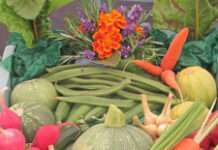K-State horticulture expert notes some tips to make spring start-up easier
MANHATTAN, Kan. – Ward Upham has a message for home gardeners as the weather turns a bit colder: Don’t rest now. At least not completely.
There’s likely still some work to be done to prep garden beds for next spring’s bounty, and other odd jobs.
“This is the time of year when there are lots of materials available to compost,” said Upham, a horticulture expert at Kansas State University. “Remember that compost needs to be kept moist so that the bacteria and fungi can break down the raw materials.”
In areas that have not received recent rains, he said, the compost pile may need to be wet down.
“Use a sprinkler to soak through the pile to the center,” Upham said. “Then, allow the pile to drain. The goal is for the pile to remain moist, not water-logged. The edges will dry out the quickest and may need a light sprinkling from time to time.”
K-State Research and Extension has several publications on composting available online. Upham said there is also a video available online to see how it is done.
Some other odd jobs that Upham said need attention now include:
• Prep soil for peas. Be ready early in the spring for peas, which grow well at a soil temperature as low as 40 degrees F. Soils may be too wet to work early in the spring, so prepping the beds now allows gardeners to get an early start.
• Work tree leaves into the garden. This should be done at least every two weeks to increase organic matter.
• Begin rabbit protection now. Rabbits like to nibble on newly planted trees and shrubs through the winter. Install a barrier of at least 2-foot-tall cylinders of 1-inch mesh, chicken wire or similar material. Remove the barrier next spring so that it does not constrict the trunk.
Upham and his colleagues in K-State’s Department of Horticulture and Natural Resources produce a weekly Horticulture Newsletter with tips for maintaining home landscapes. The newsletter is available to view online or can be delivered by email each week.
Interested persons can also send their garden- and yard-related questions to Upham at wupham@ksu.edu, or contact your local K-State Research and Extension office.
FOR PRINT PUBLICATIONS: Links used in this story
Composting (from K-State Research and Extension), http://hnr.k-state.edu/extension/publications/horticulture-practices.html
Composting video, http://tinyurl.com/jn6yppo
K-State Horticulture Newsletter, https://hnr.k-state.edu/extension/info-center/newsletters/index.html
K-State Research and Extension local offices, www.ksre.k-state.edu/about/stateandareamaps.html
K State Research and Extension is a short name for the Kansas State University Agricultural Experiment Station and Cooperative Extension Service, a program designed to generate and distribute useful knowledge for the well being of Kansans. Supported by county, state, federal and private funds, the program has county extension offices, experiment fields, area extension offices and regional research centers statewide. Its headquarters is on the K State campus in Manhattan. For more information, visit www.ksre.ksu.edu. K-State Research and Extension is an equal opportunity provider and employer.
Story by:
Pat Melgares
785-532-1160
melgares@ksu.edu
For more information:
Ward Upham
785-532-6173





